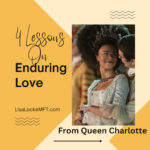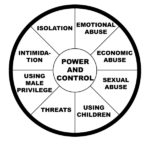If you haven’t yet seen the Netflix series Queen Charlotte: A Bridgerton Story, I highly recommend checking it out before reading this post. I just recently finished watching the captivating drama and was enthralled by the complexities of the characters and the myriad of timely topics addressed. Marriage, friendship, loneliness, responsibility, loyalty, love, family, and mental illness are among some of the issues depicted. As a marriage and family therapist, wife, and mother, I was particularly drawn to the portrayal of enduring love through many of life’s challenges.
In a world dominated by fleeting connections and temporary romances, the concept of long-term relationships can seem like an anomaly. However, this fictional story based on the historical wife of King George III, Queen Charlotte of Mecklenburg-Strelitz, provides a fascinating portrayal of the challenges and joys that can arise from enduring partnerships. Through the lens of this enchanting period drama, we delve into the realities and rewards of long-term relationships and discover why they are truly worth cherishing. Here are four lessons we can learn.
- There Will Be Storms: As we immerse ourselves in the vibrant world of “Queen Charlotte,” we witness the tumultuous journey of many different relationships. The show highlights the importance of weathering the storms together, demonstrating that greater wisdom is often on the other side of the storm and lasting partnerships require resilience and support. When Queen Charlotte says to King George, “Hide from the heavens with me,” she is compassionately reminding him of their safe space together as they battle life’s storms.
- Vulnerability Creates Intimacy: Perhaps one of the most profound aspects of long-term relationships is the trust and vulnerability that comes with time. “Queen Charlotte” exemplifies this beautifully, as characters gradually unveil their deepest fears, desires, and insecurities to each other. It is through this vulnerability that true intimacy is achieved, fostering a bond that withstands the test of time. When King George reveals his fears to his bride by saying “I’m half a man, half a king…” Queen Charlotte replies “If what we have is half then we shall make it the very best half.”
- Shared Memories and Traditions Build Connection: Long-term relationships are often built upon a foundation of shared memories and traditions, providing a sense of continuity and belonging. In “Queen Charlotte,” we see characters cherishing and preserving their history through traditions, celebrations, and shared experiences. These bonds enrich the relationship and create a tapestry of moments that can be revisited and cherished for years to come. As Young Brimsley states, “It is Coronation Day. It does not matter if they speak, they must be united.”
- Love Is A Choice: In the words of Queen Charlotte, “Love is not a thing one is able or not able to do based on some magic. Some chemistry. That is for plays. Love is determination. Love is a choice one makes.” In long-term relationships, this choice is made daily. In healthy relationships this choice is born of little and big victories, commitment, kindness, compassion, grace, forgiveness, shared joys, and pain, vulnerabilities exchanged and honored, laughter, and a lifetime of saying yes to the work and rewards of love.
Enduring love, as depicted in “Queen Charlotte,” reveals some of the realities and rewards of lasting partnerships. As we witness the triumphs, setbacks, and unwavering commitment of the characters, we are reminded that love is not always easy but it can be undeniably worth fighting for. By weathering storms, unveiling vulnerabilities, nurturing shared memories and traditions, and choosing love daily, we can build profound and fulfilling connections that stand the test of time. Just as “Queen Charlotte” has captivated audiences with its rich portrayal of relationships, real-life long-term partnerships hold the potential for a love story that transcends time.





